Rudolph virchow theory - Study guides, Class notes & Summaries
Looking for the best study guides, study notes and summaries about Rudolph virchow theory? On this page you'll find 22 study documents about Rudolph virchow theory.
All 22 results
Sort by
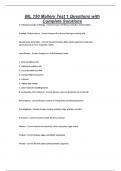
-
BIL 150 Mallery Test 1 Questions with Complete Solutions
- Exam (elaborations) • 6 pages • 2024
- Available in package deal
-
- $9.49
- + learn more
BIL 150 Mallery Test 1 Questions with Complete Solutions 3 Unifying Concepts of Biology - Correct Answer cell theory, evolution, bioenergetics Rudolph Virchow theory - Correct Answer all cells arise from pre-existing cells Spontaneous Generation - Correct Answer Francisco Redi; whole organisms could arise spontaneously or from inadamite matter Louis Pasteur - Correct Answer air is full of bacteria; broth 1. store hereditary info 2. replicate hereditary info 3. transcribe DNA into ...
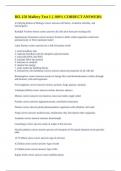
-
BIL 150 Mallery Test 1 || 100% CORRECT ANSWERS.
- Exam (elaborations) • 10 pages • 2024
- Available in package deal
-
- $11.99
- + learn more
4 Unifying themes of Biology correct answers cell theory, evolution, heredity, and bioenergetics Rudolph Virchow theory correct answers all cells arise from pre-existing cells Spontaneous Generation correct answers Francisco Redi; whole organisms could arise spontaneously or from inanimate matter Louis Pasteur correct answers air is full of bacteria; broth 1. store hereditary info 2. replicate hereditary info by templates polymerization 3. transcribe DNA into RNA 4. translate RNA ...
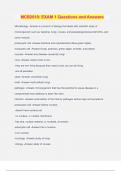
-
MCB2010: EXAM 1 Questions and Answers
- Exam (elaborations) • 19 pages • 2024
-
- $12.49
- + learn more
MCB2010: EXAM 1 Questions and Answers Microbiology -Answer-is a branch of biology that deals with scientific study of microorganism such as: bacteria, fungi, viruses, and parasites(protozoa,helminths, and some insects) prokaryotic cell -Answer-bacteria and cyanobacteria (blue-green algae) eukaryotic cell -Answer-(fungi, protozoa, green algae, animals, and plants) mycosis -Answer-any disease caused by fungi virus -Answer-need a host to live -they are non-living because they need a host, b...
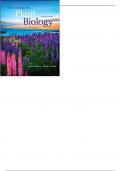
-
Stern's Introductory Plant Biology 14th Edition James Bidlack - Test Bank
- Exam (elaborations) • 479 pages • 2023
-
- $23.45
- 1x sold
- + learn more
Stern's Introductory Plant Biology, 14e (Bidlack) Chapter 1 What Is Plant Biology? 1) The early scientist who first demonstrated experimentally that plants do not have the same modes of nutrition as animals was A) Nehemiah Grew. B) Carl Willdenow. C) Alexander von Humboldt. D) Sir J. D. Hooker. E) J. B. van Helmont. Answer: E Topic: Diversification of Plant Study Bloom's: 1. Remember Learning Outcome: 01.04 List the aspects of botany with which each of the major botanical disciplines ...
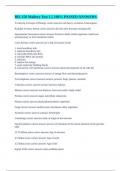
-
BIL 150 Mallery Test 1 || 100% PASSED ANSWERS.
- Exam (elaborations) • 4 pages • 2024
- Available in package deal
-
- $10.49
- + learn more
3 Unifying Concepts of Biology correct answers cell theory, evolution, bioenergetics Rudolph Virchow theory correct answers all cells arise from pre-existing cells Spontaneous Generation correct answers Francisco Redi; whole organisms could arise spontaneously or from inadamite matter Louis Pasteur correct answers air is full of bacteria; broth 1. store hereditary info 2. replicate hereditary info 3. transcribe DNA into RNA 4. translate RNA into protein 5. enzymes 6. require fre...
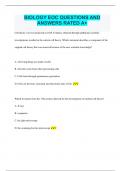
-
BIOLOGY EOC QUESTIONS AND ANSWERS RATED A+
- Exam (elaborations) • 16 pages • 2023
- Available in package deal
-
- $9.99
- + learn more
BIOLOGY EOC QUESTIONS AND ANSWERS RATED A+ Cell theory was first proposed in 1838. Evidence obtained through additional scientific investigations resulted in the current cell theory. Which statement describes a component of the original cell theory that was removed because of the new scientific knowledge? A. All living things are made of cells. B. All cells come from other preexisting cells. C. Cells form through spontaneous generation. D. Cells are the basic structural and functional unit...
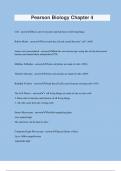
-
Pearson Biology Chapter 4
- Exam (elaborations) • 5 pages • 2024
-
- $10.49
- + learn more
Pearson Biology Chapter 4 Cell - answerBasic unit of structure and function of all living things Robert Hooke - answerDiscovered the cell and coined the term "cell" (1665) Anton van Leeuwenhoek - answerMade his own microscope, using this tool he discovered bacteria and named them animalcules(1974) Matthias Schleiden - answerNotices all plants are made of cells (1838) Theodor Schwann - answerNotices all animals are made of cells (1839) Rudolph Virchow - answerFound that all cells come fr...
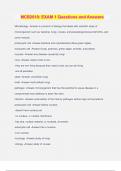
-
MCB2010: EXAM 1 Questions and Answers
- Exam (elaborations) • 19 pages • 2024
- Available in package deal
-
- $12.49
- + learn more
MCB2010: EXAM 1 Questions and Answers Microbiology -Answer-is a branch of biology that deals with scientific study of microorganism such as: bacteria, fungi, viruses, and parasites(protozoa,helminths, and some insects) prokaryotic cell -Answer-bacteria and cyanobacteria (blue-green algae) eukaryotic cell -Answer-(fungi, protozoa, green algae, animals, and plants) mycosis -Answer-any disease caused by fungi virus -Answer-need a host to live -they are non-living because they need a host, b...
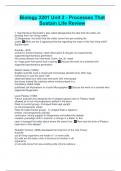
-
Biology 2201 Unit 2 - Processes That Sustain Life Review
- Exam (elaborations) • 6 pages • 2024
- Available in package deal
-
- $9.49
- + learn more
1. Spontaneous Generation: also called abiogenesis the idea that life (cells) can develop from non-living matter (2) Biogenesis: the belief that life (cells) come from pre-existing life (cells) What are the 2 opposing theories regarding the origin of the first living cells? Explain each. Aristotle - BCE worked in ancient Greece, used observation & thought (no experiments) supported spontaneous generation life comes directly from elements: Earth, fire, air, water ex: frogs grow from pond mud in ...
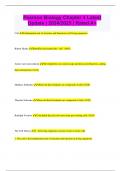
-
Pearson Biology Chapter 4 Latest Update | 2024/2025 | Rated A+
- Exam (elaborations) • 7 pages • 2024
-
- $9.76
- + learn more
Pearson Biology Chapter 4 Latest Update | 2024/2025 | Rated A+ Cell Fundamental unit of structure and function in all living organisms Robert Hooke Identified and named the "cell" (1665) Anton van Leeuwenhoek Developed his own microscope and discovered bacteria, calling them animalcules (1674) Matthias Schleiden Observed that all plants are composed of cells (1838) Theodor Schwann Observed that all animals are composed of cells (1839) Rudolph Virchow Concluded that all cells arise from...

Study stress? For sellers on Stuvia, these are actually golden times. KA-CHING! Earn from your study resources too and start uploading now. Discover all about earning on Stuvia


